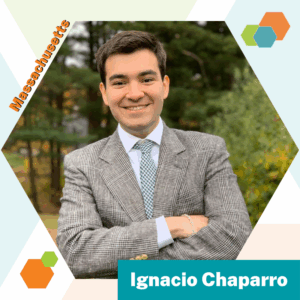 Meet systems advocate Ignacio Chaparro, a college and career readiness and pathways liaison at the Massachusetts Department of Elementary and Secondary Education and a Fellow in the third cohort of the Postsecondary State CTE Leaders Fellowship at Advance CTE – Sponsored by ECMC Foundation. Here, he describes what the work has meant to him as an individual.
Meet systems advocate Ignacio Chaparro, a college and career readiness and pathways liaison at the Massachusetts Department of Elementary and Secondary Education and a Fellow in the third cohort of the Postsecondary State CTE Leaders Fellowship at Advance CTE – Sponsored by ECMC Foundation. Here, he describes what the work has meant to him as an individual.
Q: Let’s start with your journey into CTE. How did your background shape your path into this field?
A: My career began in higher education (4-year institutions) and has since then taken me on a journey of developing and implementing policy both at the state and local levels across K-12. I have always taken an interest in the transition that students experience from secondary to postsecondary (community and technical colleges), and Career Technical Education (CTE) is one of many pathways that students engage with in their academic and life journey. Working at the Department of Elementary and Secondary Education (DESE) in the Office of College, Career, and Technical Education has been an opportunity to support the field as these academic programs are developed and to gain a macro-level perspective on the diverse needs of our students, educators, and communities in the Commonwealth.
Q: The development of a postsecondary ecosystem aligning resources and common processes across community and technical colleges and feeding into four-year universities is a daunting task in most states. How do you address this challenge in Massachusetts?
A: Developing statewide postsecondary systems that address the needs of our communities meant creating a working group where our communities are represented. So, our office launched the Postsecondary CTE Statewide Systems Working Group, composed of representatives from our postsecondary, Carl D. Perkins Career and Technical Education Act (Perkins)-eligible institutions, higher education, and K-12. This group ranged from college presidents to coordinators to superintendents. This working group met on a monthly basis and engaged in research, conversations, and policy development that identified the needs of their institutions and communities and supported the work across Massachusetts.
Data is a fundamental and necessary component to being able to build systems that are sustainable.
Q: You’ve been vocal about the need to redefine and clarify accountability metrics and systems for data collection. Why do you think this is such a crucial issue?
A: Data is a fundamental and necessary component to being able to build systems that are sustainable. When we think about data, it informs the direction of the work, provides opportunities to set goals, and can be leveraged to improve programmatic offerings to better support workforce and community needs.
Q: You’ve spoken before about the need to evaluate systems of support for postsecondary CTE. Can you share how this commitment has shaped your leadership and actions in your current role?
A: DESE’s Educational Vision communicates how, as an agency, we are a partner to the field. Launching the Postsecondary Working Group is a continued step in the direction of evaluating and building on systems of support for the postsecondary CTE field. One of the recommendations that emerged from the work over the past year has been the development of a professional learning community. Through this community, there are a plethora of opportunities to engage and identify best practices, learn from each other, and raise awareness around problems of practice.
Q: What do you see as the future of CTE in Massachusetts and what challenges do you think need to be addressed?
A: The future of CTE in Massachusetts is continued vertical and horizontal alignment among K-12, postsecondary, and higher education that addresses the needs of our workforce and communities. One area of navigation that I believe exists for CTE is the question and role of artificial intelligence and generative AI.
Q: You’re clearly passionate about creating long-term change. What advice would you give to others who want to make a difference in CTE and postsecondary participation and attainment?
A: Get involved in your community! Join an advisory committee or engage in your local school committee about the programming being offered in your community. Or, if you have the opportunity to build partnerships with your local school, offer internships, college credit, or work-based learning opportunities for students.
Q: As a participant in Advance CTE’s national Fellowship, what do you hope to gain from this experience?
A: Perspective. The opportunity to learn from people with a wide range of experiences and backgrounds across the country, and to engage with colleagues who are engaged in similar or relevant work.
Ignacio’s journey to CTE leadership expands on his innate desire to align secondary and postsecondary systems. His insights are just one example of the incredible work being done by the Fellows of the Advance CTE National Fellowship. To learn more about Ignacio and other inspiring leadership Fellows, visit the Postsecondary State CTE Leaders Fellowship page, where Fellows share processes and practices to improve postsecondary CTE.
Interested in developing your own CTE leadership fellowship in your state? Request more information via our request form or contact Dr. Kevin R. Johnson Sr. at [email protected].

